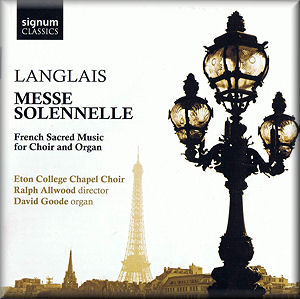 |
 |
|


alternatively
CD:
MDT
AmazonUK
Sound Samples and Downloads
|
French Sacred Music for Choir
and Organ
Jean LANGLAIS (1907 - 1991)
Messe Solennelle (1951) [18.43]
Déodat DE SÉVERAC (1872 - 1921)
Tantum Ergo [2.27]
Pierre VILLETTE (1926 - 1998)
O Salutaris Hostia, Op. 21 (1954) [2.49]
O Quam Amabilis, Op 71 [3.57]
Olivier MESSIAEN (1908 - 1992)
O Sacrum Convivium [4.21]
Institution de l'Eucharist [6.22]
Marcel DUPRÉ (1886 - 1971)
Ave Verum, Op 34, No. 1 [2.48]
Pierre VILLETTE (1926 - 1998)
Jesu, Dulcis Memoria, Op 78 [3.34]
Panis Angelicus, Op 80 [3.09]
Francis POULENC (1899 - 1963)
Salve Regina [4.07]
Jean ROGER-DUCASSE (1873 - 1954)
Regina Coeli (No. 1 from 3 Motets) [4.07]
Pastorale [12.17]
 David Goode (organ)
David Goode (organ)
Eton College Chapel Choir/Ralph Allwood
rec. Eton College Chapel 11, 18 January, 6 March 2009
 SIGNUM CLASSICS SIGCD206 [69.04]
SIGNUM CLASSICS SIGCD206 [69.04] 
|
|
|
The Messe Solennelle by Jean Langlais belongs to a long French (perhaps even Parisian) tradition of writing masses which involve choir, orgue de choeur and grande orgue. This style of mass with two organs arose from the rather distinctive nature of musical organisation at major French churches. This is characterised by a grande orgue at the west end of the church played by the titulaire, forming an essentially separate entity from the choir, orgue de choeur and choir director based at the east end of the church. The resulting masses can often be very thrilling as they pit the full majesty of the grande orgue against the choir, and also have a fascinating spatial quality owing to the placement of the grande orgue at the opposite end of the church to the choir - something Berlioz exploited in his Te Deum. Most UK churches are not built on the French model and few have two organs with the large one placed at the west end. This means that performing the mass in this form is rather difficult. There is also a provision for a single organ part and it is in this form that the work is usually encountered.
It is perhaps a moot point how much difference it makes hearing the work played with two organs accompanying. On this disc, Eton College Chapel Choir are accompanied by the magnificent 1902 Hill organ in the chapel, an instrument which seems entirely able to encompass Langlais’s dramatic requirements, though it rarely sounds convincingly French. A good compromise candidate in this regard would be Westminster Cathedral’s 1988 recording, coupled with Langlais’s Missa Salve Regina. Westminster use only a single organist, but their organ is configured with the grande orgue at the West end of the church.
But the focus of this disc is not so much on Langlais’s mass as Eton College Choir itself, as the 560 year old ensemble (founded in 1441) demonstrates its versatility by presenting this attractive programme of French 20th century choral music, teaming Langlais up with a variety of composers both well known and lesser known.
The choir, as currently constituted, comprises some four dozen singers, these are mainly boys from the school with the occasional master. The youth of the choir means that it has a rather particular sound, generally attractively bright and forward but with a hint of shallowness which comes from the lower parts being taken by young voices. As heard on this disc they demonstrate a pleasing pliability and responsiveness, tackling a challenging programme with enthusiasm and aplomb.
Whilst Langlais was just a year older than Messiaen his music lacks the cosmic density achieved by the younger man. Both were devout Catholics but Langlais remained wedded to plainchant and traditional forms, his oeuvre mainly devoted to sacred music for use within the liturgy. The Messe Solennelle is one of his masterpieces as it stretches his style to the limit, eschewing direct quotation from plainchant and replacing it with something equally flexible and distinctively in Langlais’s style.
The Langlais mass is accompanied by a group of 20th century motets, some well known, some less so. Perhaps the best known is Messiaen’s O Sacrum Convivium, sung with nicely dark tones. Also familiar is Poulenc's Salve Regina, delightfully melodic and rather less complex than some of his other motets.
Paul Villette is represented by four motets. Whilst Langlais and Messiaen had musical lives firmly based in Paris, Paul Villette’s career was in the provinces; he was the director of the Conservatoire at Besançon before moving to Aix-en-Provence. Villette’s popularity has increased somewhat in recent years, mainly due to his discovery by English choirs who seem to appreciate his distinctive style which stretches romanticism through the chromaticism of Debussy towards a chromatic, jazz-influenced harmonic style, all placed firmly in the context of the traditional liturgy. Of the four motets presented here, O salutaris hostia, dating from 1954, is the most challenging and complex, whereas the other three are late works and are approachably melodious. The choir give nicely judged performances of these, imparting a shimmering beauty to Villette’s close harmonies, though there is the odd moment when you feel the hard work and the performance could be more relaxed.
The remaining motets are from the charming fringes: Déodat de Séverac's lovely Tantum ergo, the Ave Verum by Marcel Dupré (who taught Langlais and Messiaen) and Roger-Ducasse's Regina Coeli, all given nicely understated performances.
Finally, the disc includes two substantial organ pieces, Messiaen's Institution de l'Eucharist from Livre du Saint Sacrement and Roger-Ducasse's Pastorale. The Messiaen is particularly welcome as the composer wrote little other suitable choral music.
If you are looking for a disc of French music for the library shelves, then this isn't quite it. The choir certainly do not sound French and on occasion rather reveal their youth. But on the other hand these are fresh performances which bring out the charm of the smaller works and convey the strength of the mass. Well worth investigating.
Robert Hugill
|
|
|

